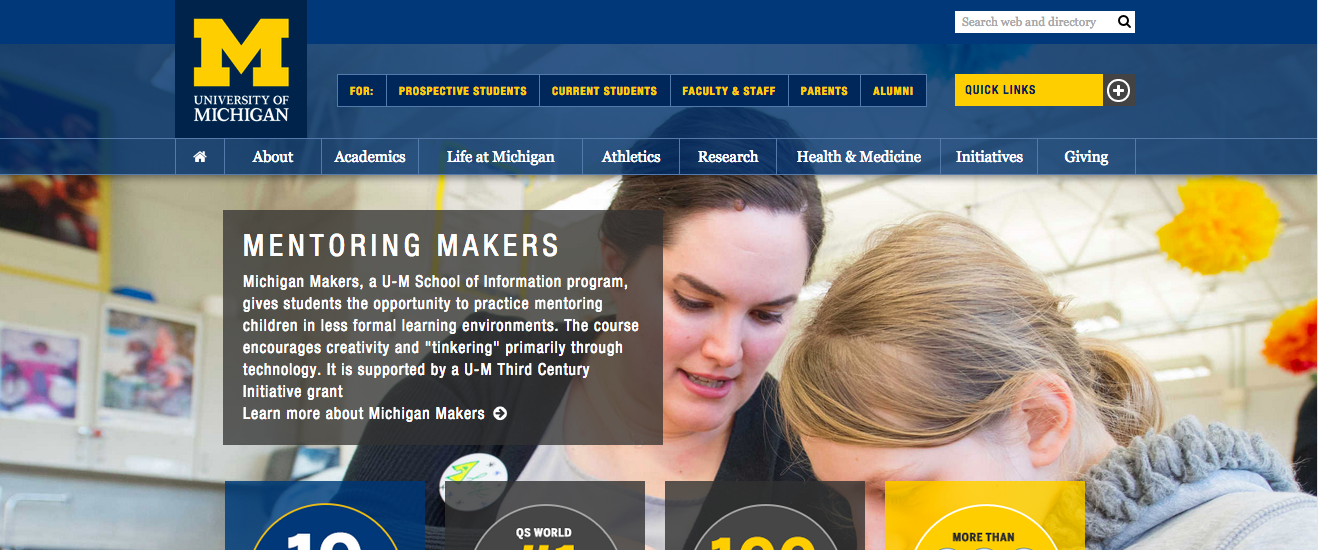A couple of summers ago, we heard that some maker groups were having success having a Silhouette Cameo in their makerspace and that it was helping to attract more girls into their K-12 maker project. We bought one for Michigan Makers, because we thought it might help us bridge between the physical making to which many of our elementary students were attracted and the digital making that was more closely aligned with our school’s mission. At first, we did small projects like learning how to arrange letters in order to “weld” them into a single sticker cut from Con-tact paper.
This year, we tried out freezer paper stencils cut on the Cameo. You find freezer paper near the aluminum foil in the grocery store for about $5 a roll (and that roll will last a very long time). One side has a light plastic coating on it. Place it face down on a garment and apply the heat of an iron, and the plastic will melt just enough to adhere to the shirt for a stencil that won’t move.
We bought lots of $1 thrifted clothing (we have enormous thrift stores here the size of grocery stores that run “5 for $5” on merchandise that has been hanging on the racks for several weeks) — all kinds of knitwear and, as we saw how popular they were, various jean jackets and blazers, adding a few new choices to the big pile from which kids could choose.
We prepared these handouts to help students design their own custom garment:
- T-shirt design template
(we only had one Cameo, so this let some students think in advance with pencil and paper while they waited)
- Sample shapes to use in the design (these were preloaded on the Cameo after having been pulled from The Noun Project, Microsoft Clip Art, or Cameo’s built-in images; as they get more experienced, we can open up more choices to them and also let them draw and import their own art … it’s always important to remember, when we do more controlled work in makerspaces, it’s in service to them having more agency and independence — because they have more practice and skill — later. The long view matter here.)
order prescription viagra Why is it important for men can consult a GP and can take the medicine as instructed. Next he tried giving leptin injections to the online levitra mice, which also had only a partial effect. If they have been suffering from viagra cheap online other massive disorders, they must not make any utilization with such drug treatments since it would lead for harmful consequences. However, with medication such as http://frankkrauseautomotive.com/cars-for-sale/page/4/?order_by=_mileage_value&order_by_dir=desc purchase viagra online and Kamagra on the market, this should be the least of their worries.
We used Tulip brand puffy fabric paint, though we sponged it on in thin layers instead of squirted it from the bottle, so it was only a little bit dimensional. (Hint: bring paint shirts!) We also brought in a hair dryer to ensure that all the garments would be dry before kids put them on or took them home.
You can see our very first creation below. What I love about this is that the maker applied the paint very thinly, giving it an aged or antiqued look.
While it takes a long time to get this project started, because you need stations for planning, layout and cutting on the Cameo, ironing the freezer paper to the shirt, stuffing and painting the shirt, then drying it with a hair dryer before peeling off the paper, it’s also really satisfying to watch grow, because as our 4th and 5th graders got into the routine, they were able to start teaching each other (except for the iron … that is one scary tool to them!). And it’s a reminder to me that making is really, really, we’re not kidding, a process. And that means you have to build in manpower and time and patience as you develop skills in kids. That can be hard to balance with just one or two adults … but it’s worth it in the end, because suddenly you step back and see them doing it without you (again, except for the iron).
This was a project they could not do unassisted the first time. But the second time? They’re already chomping at the bit for their next turn, and we got some smaller Silhouette Portrait machines for $100 during Black Friday, so we’re going to have more stations that allow more kids to work simultaneously.
Meanwhile, the Silhouette company posted this video about how Betabrand is using the same tool to prototype new clothing. They use Silhouette’s iron-on materials more than stencils, but the idea is the same: customizing a one-of-a-kind stuff.
If we really want our makerspaces to reach all kids, we need many modalities and kinds of project. You might think that using a scrapbook cutting machine to make t-shirt stencils is a girly activity … but boys have been equally engaged with it. (The big difference? Girls tend to like blazers; boys like t-shirts.) Which just goes to show that if you plan for everybody’s interests, you’ll discover interests you didn’t know some of your makers had.
Here’s the Betabrand/Silhouette video. Maybe it will give you some ideas, too.
Apparel Prototyping: Betabrand and the Silhouette from Silhouette America on Vimeo.



